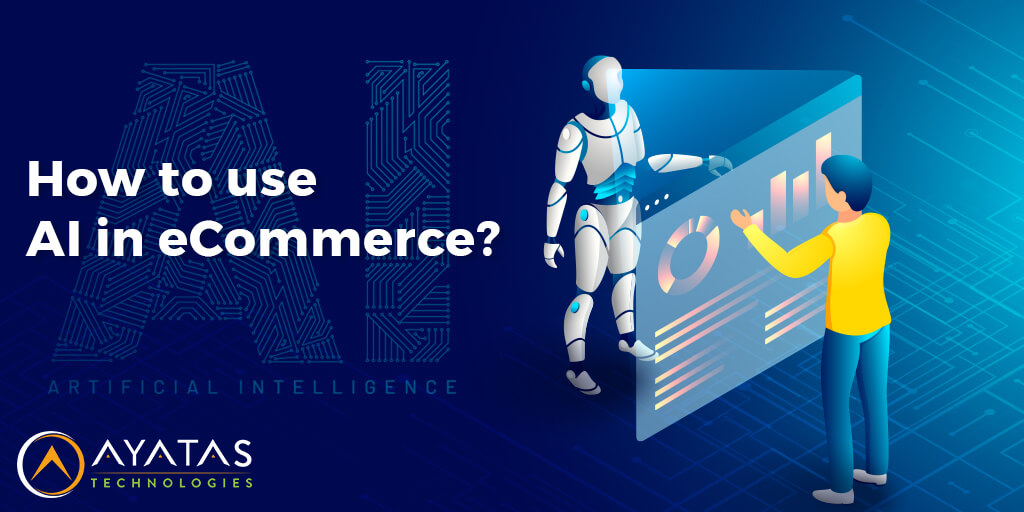
How To Use AI In eCommerce?
When someone says “artificial intelligence,” a sci-fi movie scene could be the first thing that comes to mind. But regarding the eCommerce industry, it’s about more than robotics that matches humans and more about the fundamental learning technologies and algorithms. Today’s online businesses use AI to provide a perfect customer experience on and off their eCommerce sites. This article will explore how to use AI in eCommerce business.
The Role of AI in eCommerce
In the eCommerce sector, artificial intelligence (AI) is a powerful tool that enables companies to improve customer service, streamline supply chains, and increase sales. But what does artificial intelligence mean? And why, in the first place, should you even bother? The explanation is quite simple. Due to recent technological developments, AI is used in various sectors, including health, retail, and manufacturing.
Customers are using it to help them make better purchases. AI can also be used to improve customer service in general. They can enhance chatbots and virtual assistants (VAs) in various purchasing stages where human assistance is most necessary. The increased usage of AI in eCommerce may significantly decrease the workforce required, cutting the cost of suppliers and ultimately benefiting customers.
Types of AI technology Used in eCommerce
AI is a complex tool, and there are 4 types of AI technologies utilized in eCommerce businesses.
Data Mining: The process of finding data for AI algorithms and systems is known as data mining.
Natural Language Processing (NLP): Natural language processing aims to make it likely for computers to understand and create natural human language.
Computer Vision (CV): Computers can now analyze data from photos and videos through artificial intelligence known as computer vision.
Machine Learning (ML): Machine Learning uses statistical methods, including algorithms, to enable computers to learn from data and make predictions and conclusions without having to be manually programmed,
Uses of AI in eCommerce
Pricing in eCommerce
AI also enables you to customize your pricing. You can change offers and prices according to your website’s users and actions. Even your prices can be modified according to the worldwide supply and demand. This strategy enables businesses to use a scalable, dynamic, flexible pricing approach linked to their profit targets. You can, for instance, raise prices when your competitor’s supplies are running low. Customers who want to purchase a product immediately will likely pay more at your store if they can get it sooner.
Fraud Prevention
AI-based machine learning can identify unusual and suspicious behavior and transactions by looking at millions of online transactions. For example, a customer might have placed an unusually high number of orders quickly, submitted an incorrect address in the address field, or neglected the essential details required to deliver an order. Humans are unable to detect and analyze such data in real time. AI models have complex guidelines that help prevent the occasionally disastrous results of fraudulent transactions. AI helps companies prevent fraud, reducing revenue loss and raising credit acceptance rates.
Shopping Experience Customization
Personalization is nothing new, but AI makes creating a personalized buying experience simpler and quicker. You can quickly look at hundreds of customer records from different channels using AI-powered recommendation engines. Such tools can automate call-to-action messages and product recommendations when paired with eCommerce websites to lower cart abandonment rates.
The recommendations made by virtual assistants like Mona are similarly based on specific customer inquiries. Virtual assistants conduct focused marketing by providing offers and items relevant to customer preferences. They frequently take the shape of smartphone apps. Retail firms can provide a uniform, smooth customer experience across online and offline stores because of the data and automation given by AI.
Inventory Management
In several ways, AI, particularly machine learning, increases the effectiveness and accuracy of inventory management. Online businesses can use AI technologies to improve their supply chains. AI could help the supply chain management of an eCommerce business in several ways, including customer demand forecasting, product restocking planning, and bottleneck removal.
Robots powered by artificial intelligence (AI) help warehouse management by simplifying order processing and minimizing human error. Artificial intelligence reduces carbon footprint and inventory discrepancy by improving warehouse efficiency.
Managing Fake Reviews
The reviews your customers read online on eCommerce sites mainly influence them from buying products. You can come across bad product reviews on many occasions. What if the same reviews prevent people from buying your product? Many eCommerce businesses are utilizing AI to deal with these fake reviews.
Target Potential Customers
Another area of artificial intelligence is predictive analytics. For making predictions, it searches for patterns in the data. eCommerce companies use this technique and customer behavior analysis to predict market trends to improve their targeted marketing campaigns. You can use tailored advertisements to target online customers to your eCommerce site and influence their buying choices.
AI-Powered Chatbots
One of the most often used AI applications in eCommerce businesses is chatbots. 58% of B2B and 42% of B2C businesses use chatbots actively in 2022. 88% of online customers had interacted with the chatbot, and 69% were satisfied with the chatbot’s response. AI chatbots act as customer care representatives and use vast language models to provide a customer-focused search experience. Customer engagement is increased when AI chatbots are added to customer care or shopping carts, improving the online buying experience.
How to Integrate AI Into Your eCommerce?
Create a plan of action for businesses that have decided to use AI. We recommend the following steps:
- Make a plan for how you will use AI to improve your company. Your data should serve as a guide for this plan.
- Make AI initiatives a priority in your organization. Make sure to provide all the support and data it needs to succeed.
- Choose the appropriate expertise and skills. With your company’s AI, you can only depend on yourself. You need data scientists to design your programs and ensure that you collect high-quality data. Unstructured data or flat files still provide the most valuable information for AI. The value of AI is limited if you don’t have sufficient data. Most businesses are dedicated to collecting and maintaining data, but many lack the resources and expertise.
- It’s time to start when your strategy, budget, and expertise are sorted out. Pragmatism, along with Saas AI solutions, can help to achieve success.
Benefits of Using AI in eCommerce
AI offers several benefits to eCommerce businesses:
- Personalized Customer Service: AI can observe data from various sources and user feedback to evaluate customer interactions. eCommerce websites can use this data to provide a smooth multichannel customer experience. By collecting consumer data, you can build customized offers that encourage customers to make purchases by identifying your customers’ preferences.
- Increased Sales: To customize your sales funnel, AI can help create a more effective sales process by collecting and analyzing customer information. With additional information, you can reach the right prospects at the right time with the right message.
- Automation: Automation of tasks like emailing, order fulfillment, customer care, and payment processing is possible with AI. Automations enable you to reduce labor expenses and improve operational effectiveness, giving up more time for innovation and less time for maintenance.
Challenges of Using AI in eCommerce Business
While AI has several benefits in eCommerce, it also has some challenges:
- Privacy of Data: Consumer data is used by AI systems to generate personalized suggestions and predictions. The collection of this information raises questions regarding data security and privacy. AI additionally constitutes a security risk to businesses regarding proprietary information, increasing the possibility of accidental leaks and breaches.
- Initial Investment is High: Implementing AI can be expensive, and organizations must invest in talent, infrastructure, and maintenance. Additionally, AI solutions only sometimes provide a positive return on investment (ROI).
- Potential for Poor Customer Support: Since chatbots are used in AI customer service, you might be unable to provide the same assistance and care as a real customer service professional. AI customer service can result in dissatisfied consumers and a bad reputation when done incorrectly.
Conclusion
Making data-driven strategic decisions and expanding your business much more quickly can be made possible by integrating artificial intelligence into your eCommerce business. Consult an eCommerce solution expert if your business requires assistance navigating the opportunities that AI provides to eCommerce or integrating AI with the present strategy, tools, and platform. Our team at Ayatas Technologies has professionals with global expertise who can help you provide a unique eCommerce solution. Do not hesitate to contact us for a FREE consultation about eCommerce.



